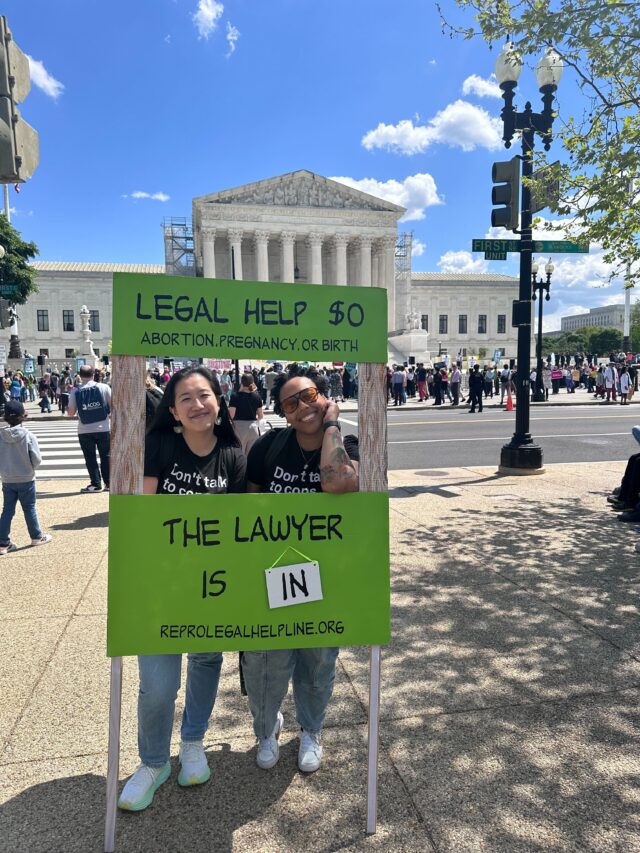If / When / How: Defending Reproductive Justice

Since the 2022 Dobbs v. Jackson Women’s Health Organization decision nullified federal constitutional protections for abortion, abortion opponents have escalated their efforts to stigmatize health care, target clinics and patients, and otherwise obstruct people’s access to reproductive care. 18 states have outright bans or ban abortion after 12 weeks, leaving 28 million women – 43% of all women of reproductive age, plus trans and nonbinary people – in states without access to health care. Post-Dobbs, there has been increased stigma and surveillance across the country. Efforts to criminalize people for their pregnancy outcomes – including miscarriages, stillbirths, and abortions – often target or disproportionately impact people who are already more vulnerable to targeting for prosecution, including immigrants, people who are low-income, survivors of intimate partner violence and sexual assault, and people who use drugs.
Since 2019, If/When/How has used its unique and deep expertise to address the criminalization of individuals for their abortions. The organization works to forge a future where every person has the power and support to make decisions about their bodies, families, and communities, without barriers, coercion, or punishment, in safety and with dignity. If/When/How’s team of legal experts: a) keep people from becoming entangled in criminal prosecutions for their abortion or pregnancy outcomes; b) support and defend them if they are; and c) work to change the law to ensure that no one is criminalized in the first place. Through its Repro Legal Helpline, If/When/How provides free, confidential legal services for abortion, pregnancy loss, and birth to address immediate threats to individuals and reduce the harm of criminalization.
Take, for example, a recent case from Texas. In June 2023, If/When/How’s Repro Legal Helpline was contacted by a person whose friend, “C,” was being denied life-saving abortion care while being held at a hospital for complications related to her pregnancy. Not only was she denied the care she needed—she had been at the hospital for over a week—but C was not offered or provided translation services, despite being a monolingual Spanish speaker.
If/When/How’s team jumped to action. First, they connected C with a Spanish-speaking Helpline attorney, who immediately secured a local bilingual advocate from the If/When/How Network to provide on-the-ground support. Within two days, C was transferred to another facility and received the critical abortion care she needed.
C was severely traumatized by the experience of being denied health care and expressed a desire for access to therapy. If/When/How’s Repro Legal Defense Fund – which covers bail/bond costs, funds legal defenses, and provides holistic support for people facing prosecution for their reproductive outcomes, and their helpers and supporters, too – provided the funding for that care. A Helpline counsel then filed an administrative complaint on behalf of the client, challenging the hospital’s failure to offer or provide her with interpretation or translation services. This case demonstrates the far-reaching impact of If/When/How’s multi-faceted expertise and support.
Since early 2025, there has been a surge in demand for If/When/How’s services, especially the Repro Legal Helpline. More calls came into the Helpline in January 2025 than in any prior month, even in the immediate aftermath of the 2022 Dobbs decision. Between January and April 2025, the Repro Legal Defense Fund spent over $2M in bail, bonds, and legal fees—the same amount spent in the previous three years combined. In the midst of fear, confusion, and increasing risk, If/When/How supports callers with free, confidential, and accurate legal information, resources, and holistic support.
The Overbrook Foundation is proud to partner with If/When/How in our mission to advance reproductive health, rights, and justice. The right to reproductive autonomy means that all people have safe access to health care, free from threat of persecution. Overbrook’s Human Rights Program supports If/When/How, along with a network of trailblazing partners, who are leading the legal strategy to defend patients, providers, and organizations upholding this essential human right.